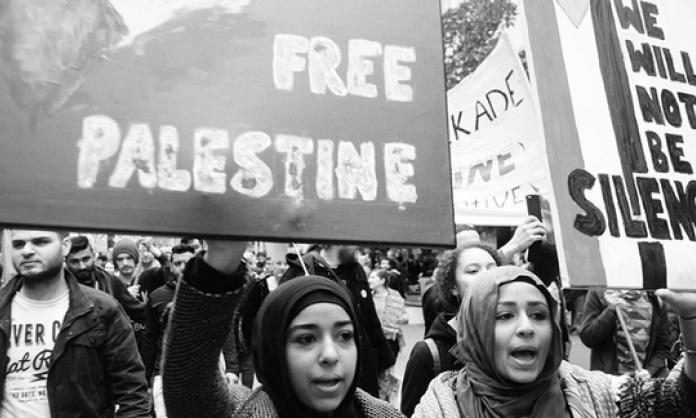Two groundbreaking reports have revealed the methods of intimidation, harassment and slander used by pro-Israel activists to silence Palestine solidarity activists on US university campuses.
“The Palestine exception to free speech”, published by Palestine Legal, records the astonishing attempts to use censorship and slander to repress activists. The report notes 173 requests for assistance in just the first half of 2015, with students and academics making up the overwhelming majority of victims. The attacks are often coordinated by well-funded pro-Israel lobby groups, think tanks and legal firms.
Palestine Legal identifies nine tactics used by Zionists, which will be familiar to any of those who have engaged in Palestine solidarity activism: false public and private accusations of anti-Semitism; seeking and obtaining official denunciation from figures such as senior university managers; bureaucratic barriers, such as unaffordable booking fees, which prevent activists from organising public events; administrative sanctions, including the banning of student groups that have participated in protests; threats to academic freedom; legal threats and lawsuits; legislation; and, finally, criminal proceedings.
The report makes chilling reading. And the tactics listed are well known here in Australia. Last year, the Socialist Alternative club at Monash University organised a pro-Palestine meeting on campus. The Zionist reaction included public statements that Jewish students were being physically attacked on campus; statements from university management and an op-ed by the then education minister Christopher Pyne, calling for the club to be driven off campus; attempts to discipline academic staff who signed a letter in support of the pro-Palestine activists; and ultimately the banning of the club at Monash.
“Stifling Dissent”, published by Jewish Voice for Peace, is notable for its depiction of political tensions emerging within the campus Jewish community.
Growing numbers of Jewish students are critical of the Israeli state. But as the campaign for boycott, divestment and sanctions grows, campus Jewish organisations such as Hillel have refused to allow their members to collaborate with any supporters of the campaign.
Liberal Zionist organisations such as J Street have been banned from participation in the official life of Jewish student organisations, on the grounds that their advocacy of a two-state solution is “beyond the pale” and “abetting the movement to demonise Israel on campus”.
The politics of campus-based Jewish organisations remains firmly on the right, while their appearance as neutral cultural and religious groups allows them to smear any public promotion of pro-Palestine politics as a form of anti-Semitic bullying. In this they are aided by university codes of conduct and civility, an increasingly useful weapon for the defenders of Israel.
In 2011, the University of California Santa Cruz was pressured to ban the screening of Between two worlds, a documentary by two Jewish film-makers exploring political divisions within the Jewish community, on the grounds that the screening would “foment a hostile campus climate towards Jews”. In 2014, professor Steven Salaita was dismissed from his tenured position at the University of Illinois because his criticisms of Israel on social media were claimed to violate standards of “civility”.
As universities are subjected to increasing political and intellectual surveillance, where dissent becomes “bullying” and protest becomes “extremism”, these two important reports underline the importance of standing up to those who would drive all political opposition into the shadows.
In a way, their exhaustive documentation of the desperate and viciously anti-democratic methods of campus Zionists is a testament to the unbreakable tenacity and growing influence of the global movement in solidarity with the Palestinians.








